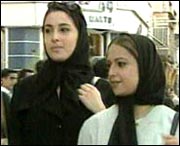|
 |
| Many of Iran's urban, educated youth want the same opportunities offered their Western counterparts. |
Days after President Bush located Iran on the international "axis of evil," Tehran's 20-somethings say they feel misunderstood, marginalized and resigned.
Sitting in a Tehran living room just days after Bush told the world her country exports terror, 25-year-old Neda Ghasemi said she wondered if the West would everget the pictureright.
"I have heard that a lot of foreigners think that we go around on camels," she said. "Considering their people think this, it doesn't matter that the American government thinks we are terrorists."
Bright, educated and ambitious, Ghasemi was being flippant, and she knew it. But her comments betrayed Iranians' very real need for the world to simply understand them.
Like her three friends gathered in the apartment, Ghasemi said she was frustrated that the outside world still associated Iran with the images of the Islamic Revolution 23 years ago - angry crowds burning the U.S. flag amid chants of "Death to America," and the faces of the American hostages held for 444 days in the U.S. Embassy in Tehran.
The new generation is not in power. And they're not close to taking power. But there's no revolutionary fervor in Iran today. Instead, dull resignation has seeped in.
According to Shiva, a young actress, when the reformist President Mohammad Khatami came to power in 1997, her generation was full of hope.
But their optimism was premature, Shiva said. Almost four years after he was elected, Khatami's vision continues to be hampered by the influential Iranian clerics and conservatives who drove the Islamic Revolution decades ago.
Many young Iranians just want to enjoy the freedoms and opportunities that they see are offered to their generation in the West. The government does not place any obstacles in their way but getting visas for the United States, Canada or European countries is not easy.
Many young people here resent Bush and Rumsfeld's comments last week. With access to the satellite TV, most Iranians are well informed. They chat with relatives and friends abroad on the Internet. And they readily distinguish between the American people and their government.
Their only disappointment is why Americans don't do the same for them.
Elahe, a theater director who attended one of a few candlelight vigils in Tehran for the victims of the Sept. 11 attacks, said she felt angry that after risking arrest to take part in these vigils, she heard Bush brand her country a supporter of terror.
"I didn't do this for politicians," she said. "I did this for the people. Therefore that judgment is not important for me."
Notes:
Angst: feeling of anxiety, guilt or remorse, especially about the state of the world
Get the picture: (informal) understand
(Agencies)
|
自從布什在《國情咨文》中拋出"邪惡軸心"論后,伊朗首都德黑蘭的一些20歲左右的年輕人感到他們被(西方)誤解和排斥,并且表示他們看透了這一切。
聽到布什在《國情咨文》中向世界宣稱伊朗是"恐怖之源"后,25歲的內(nèi)達(dá)·卡西米在德黑蘭家中的起居室接收記者采訪時(shí)說,她懷疑西方國家將永遠(yuǎn)不會(huì)對(duì)伊朗有正確的認(rèn)識(shí)。
她說:"我聽說許多外國人認(rèn)為我們外出的交通工具還是駱駝,如果人們都這樣想,那么我們被美國人認(rèn)作是恐怖分子也就不足為奇了。"
卡西米是一位聰明、有教養(yǎng)、有理想的年輕人,盡管她這么說有些輕率,她自己也清楚這一點(diǎn),但是她的話還是代表了伊朗人的心聲--希望世界了解一個(gè)真正的伊朗。
外界談及伊朗,總會(huì)聯(lián)想起23年前發(fā)生伊斯蘭革命時(shí)的伊朗,卡西米和她的三位室友對(duì)此感到十分沮喪。在那次革命中,憤怒的人群焚燒了美國國旗和被軟禁在德黑蘭美國使館中444天的美國人質(zhì)的照片,并高喊"去死吧,美國人!"
伊朗當(dāng)代的年輕人還沒有開始掌握國家的大權(quán),事實(shí)上他們對(duì)權(quán)力已經(jīng)沒有什么渴望了。如今伊朗的年輕人也沒有了當(dāng)年伊朗人的革命激情,相反,消極的逆來順受的思想正逐漸深入人心。
據(jù)年輕的女演員希瓦說,1997年伊朗改革派總統(tǒng)穆罕默德·卡塔米當(dāng)選時(shí),他們那一代人當(dāng)時(shí)對(duì)未來充滿希望。
但是希瓦說,他們的樂觀為時(shí)過早。因?yàn)樵诳ㄋ咨吓_(tái)4年內(nèi),他的政見不斷受到勢力強(qiáng)大的伊朗宗教和保守派的反對(duì),而保守派正是20幾年前"伊斯蘭革命"的發(fā)動(dòng)者。
許多伊朗的年輕人向往西方國家的同齡人享受的種種自由和機(jī)遇。雖然伊朗政府對(duì)這些年輕人出國大開綠燈,但是要得到美國、加拿大或者歐洲國家的簽證絕非易事。
許多年輕人對(duì)上星期布什和拉姆斯費(fèi)爾德的言論(1)頗為不滿。由于可以收看到衛(wèi)星轉(zhuǎn)播的電視,大多數(shù)伊朗人都知曉時(shí)事。他們同國外的親友在互聯(lián)網(wǎng)上大談此事,但是伊朗人民并沒有將美國人民和美國政府的觀點(diǎn)混為一談。
讓伊朗人感到失望的是,為什么美國人不能同樣理智的對(duì)待他們呢?
伊拉希是一家劇院的經(jīng)理,她參加了在德黑蘭舉行的一次悼念9·11遇難者的燭光守業(yè)活動(dòng)。她說,人們冒著被逮捕的危險(xiǎn)參加這樣的活動(dòng),但卻聽到布什將伊朗視為恐怖主義的支持者,這令她感到非常氣憤。
她說:"我參加悼念活動(dòng)并不是為那些政客祈禱,而是為那些遇難的普通人,所以我不在乎美國政府對(duì)我們的看法。"
(1):美國總統(tǒng)布什當(dāng)?shù)貢r(shí)間1月29日在《國情咨文》講話中,將伊朗、伊拉克和朝鮮等國稱為"邪惡軸心",此言一出,激起眾多國家的強(qiáng)烈反應(yīng)。 此外,美國國防部長拉姆斯菲爾德2月3日譴責(zé)伊朗幫助"基地"組織成員逃出阿富汗、潛入伊朗。對(duì)此,伊朗外長稱,只要伊朗在境內(nèi)發(fā)現(xiàn)有"基地"組織成員或塔利班分子,伊朗都會(huì)把他們遣返回國。
(中國日?qǐng)?bào)網(wǎng)站譯)
|
